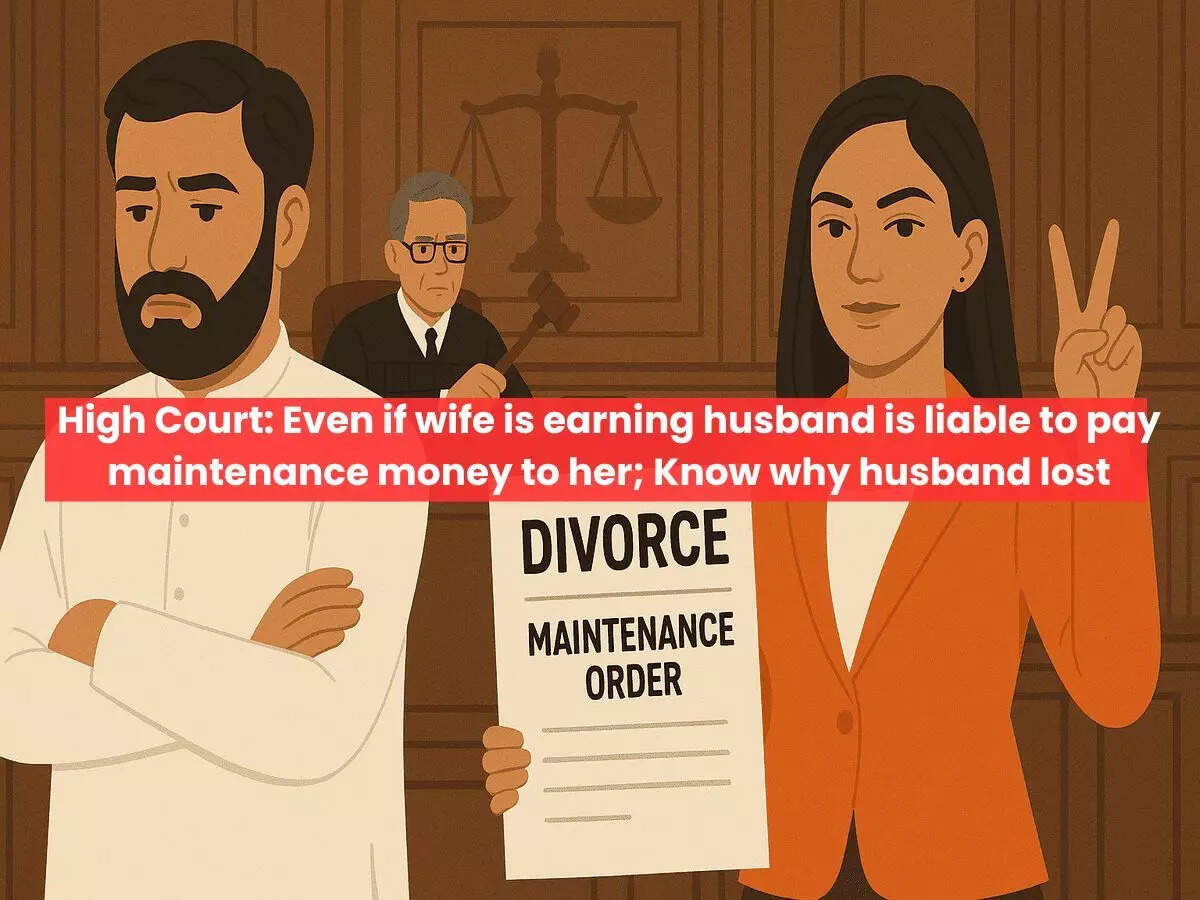The husband argued that about three years into their marriage, things started to get tense. He alleged that she was throwing tantrums and treated him very badly. The husband also mentioned that he bought a new flat hoping it would be comfortable for her, but her attitude still did not change. She kept making demands that he just could not meet, which led him to file for divorce. Soon after the husband filed for divorce, the wife submitted a maintenance petition in court.
The high court while hearing the maintenance petition noted that the husband lives in a posh locality in Mumbai and his father also gets pension while the wife is a school teacher and lives with her parents who in turn live at their brother’s house.
The Bombay High Court said: “Because of her meager earning, she is constrained to stay in the house of her brother along with her parents causing inconvenience and hardship to all of them. In such an income she is not in a position to live a decent life. As against it, if compared against the Petitioner’s (husband’s) income, his income is far more than the Respondent-wife’s, with no financial responsibilities on him.”
The husband did not want to pay any maintenance money as he alleged that he might be earning a more than her but he had necessary expenses like looking after his senior citizen parents. The Bombay High Court agreed with his argument but said that the maintenance amount that the court ordered him to pay isn’t so big that it will lead to financial issues for him.
The Bombay High Court also applied the eight factors laid down by the Supreme Court in the Pravin Kumar Jain V/s. Anju Jain ((2025) 2 SCC 227) case for calculating maintenance money amount in divorce cases. These eight factors helped the court to determine how much money the husband should pay as maintenance.
Check out the details below to know more about why this husband lost the case and the wife won. The legal arguments and insights from this case can help you in similar situations.
According to the order of the Bombay High Court dated June 18, 2025, here are the details:
- November 28, 2012: The marriage took place.
- May 2015: The wife left the matrimonial home and started residing with her parents.
- June 2019: The husband filed a divorce petition in Bandra family court under Section 13(1)(i-a) and (i-b) of the Hindu Marriage Act.
- September 29, 2021: The wife filed an interim application for maintenance.
- August 24, 2023: The family court decided to grant maintenance to the wife at the rate of Rs 15,000 per month from October 1, 2022 till the disposal of the petition.
The husband challenged this order and filed an appeal in the Bombay High Court.
What did the Bombay High Court say?
The Bombay High Court said:
(No part of the judgement is changed and everything is as per what the court said)
- The claim of the Petitioner has been falsified by the salary slips annexed to the reply affidavit filed by the Respondent herein for the months of April 2022 and September 2022, which discloses his net pay as Rs 1,51,284 and Rs 1,17,338 respectively.
- It also needs consideration that, though he claims that his parents are dependent on him, his own affidavit discloses that his father draws a pension of Rs 28,000 per month. Therefore, his parents are not financially dependent on him and in fact they must be contributing to the monthly maintenance of the family.
- I find substance in the submission of the learned counsel for the Respondent that the Petitioner has not disclosed his true income in the affidavit of assets and liabilities. The salary slips placed on record disclose his income above Rs 1,00,000.
- The Respondent-wife has disclosed her income to be Rs 18,000 per month from her salary as an Assistant Teacher working in a Convent School. Though it is claimed by the Petitioner that the Respondent-wife has an additional income from the interest of the Fixed Deposits, the interest is negligible. Even the income from tuition classes cannot be said to be a permanent source of income.
Bombay High Court final judgement
Judgement: “I do not find the maintenance awarded by the Family Court is unreasonable or extreme. Hence, the impugned order passed by the Family Court does not warrant interference. In view of the aforesaid observations, the Writ Petition is hereby dismissed. Rule is discharged.”
Legal reasoning: The Bombay High Court said: “There is a huge disparity in the income of the Petitioner and the Respondent, which cannot be compared. The Respondent-wife is certainly entitled to be maintained with the same standard of living as she was accustomed to before their separation. While determining the quantum of maintenance, the considerations that are required to be taken into consideration are the income of the respective parties; their age; their responsibilities; their reasonable needs; necessities and income derived from other sources, if any.”
Supreme Court precedent applied in this case
The Bombay High Court said: “A useful reference can be made to the recent decision of the Supreme Court in Pravin Kumar Jain V/s. Anju Jain. The Hon’ble Supreme Court in this judgment has once again reiterated the guidelines for fixing the amount of maintenance. Though it is observed that there cannot be a strict guidelines or fixed formula, but referring to the earlier judgments, the Hon’ble Supreme Court has provided the factors to be looked into while granting maintenance, which reads thus:
- Status of the parties, social and financial.
- Reasonable needs of the wife and the dependent children.
- Parties’ individual qualifications and employment statuses.
- Independent income or assets owned by the applicant.
- Standard of life enjoyed by the wife in the matrimonial home.
- Any employment sacrifices made for responsibilities.
- Reasonable litigation costs for a non-working wife.
- Financial capacity of the husband, his income, maintenance obligations, and liabilities.
The Bombay High Court said: “The factors have been laid down on the basis of the judgment of the Hon’ble Supreme Court in Rajnesh V/s. Neha and Anr. 2 as well as Kiran Jyot Maini V/s. Anish Pramod Patel.3 Applying the above factors to the fact of the present case, the wife needs to be granted maintenance from the income of the husband since her own income is insufficient for her maintenance.”
How did Bombay High Court apply the Supreme Court precedent in the present case?
The Bombay High Court said:
- In the present case though the wife is earning, the said income is not sufficient for her own maintenance since she has to travel daily a long distance for her job. She is staying with her parents which she cannot stay indefinitely.
- Because of her meager earning, she is constrained to stay in the house of her brother along with her parents causing inconvenience and hardship to all of them. In such an income she is not in a position to live a decent life.
- As against, it if compared against the Petitioner’s income, his income is far more than the Respondent-wife’s, with no financial responsibilities on him. Even assuming the certain expenses must be necessary for the maintenance of himself and the family members whom he is obliged to maintain, the amount that remains is sufficient enough to enable him to support the Respondent-wife as per the order passed by the Judge, Family Court at Bandra.
- Merely because the wife is earning, she cannot be deprived of the support from her husband with the same standard of living to which she is accustomed to in her matrimonial home.
What is the significance of this judgement?
ET Wealth Online has asked various lawyers about what might be the significance of this judgement, here’s what they said:
Tushar Kumar, Advocate, Supreme Court of India, says: The Court, reaffirmed that mere employment of the wife does not absolve the husband of his statutory obligation to provide for her sustenance, especially where her earnings are insufficient to maintain a standard of living commensurate with that enjoyed during the subsistence of the matrimonial relationship.
The ruling highlights that the principle of maintenance is not predicated solely on income but rather on the holistic assessment of the respective financial capacities of the parties, their standard of living, and reasonable needs.
More importantly, the Court came down heavily on the suppression of material facts and misstatement of income by the Petitioner-husband, who had disclosed a drastically understated figure in his affidavit of assets and liabilities, which was palpably contradicted by salary slips placed on record by the Respondent.
Shashank Agarwal, Founder, Legum Solis says: This judgment reinforces the guidelines set by the Hon’ble Supreme Court for grant of maintenance. Merely because a wife is working and having income is not sufficient for a husband to disclaim his liability to pay maintenance. For grant of maintenance, all the factors must be considered with the principle objective of maintaining the same standard of living that the wife was maintaining with the husband.
Chinmay Bhosale, Advocate, Bombay High Court, says: This judgment reiterates the stand of the Supreme Court that even if the wife is educated and has an earning job , she is entitled to maintenance if her income is not sufficient to maintain the standard of living . This is a very significant ruling from the perspective of men. It raises alarming questions surrounding gender equality rights & men’s rights. A rising trend of transferring all assets to parents before marriage is seen due to such judicial norms being mandated in the country.
Siddharth Joshi, Advocate, Delhi High Court, says: The Court while ascertaining the interim maintenance to be paid to wife will consider these additional factors in addition to income earned by husband:
(a) Income of the parents of the husband
(b) Standard of life enjoyed by the wife in the matrimonial home.
(c) Reasonable needs of the wife.
(d) Assets owned by the husband.
Considering the position taken by Bombay High Court, the husband must be very conscious while appealing an interim order of maintenance and must not base the challenge only on the income earned by him and his wife. Husbands while litigating the maintenance orders must look into the income of the family as a whole and the standard of life enjoyed by the wife in the matrimonial home.



